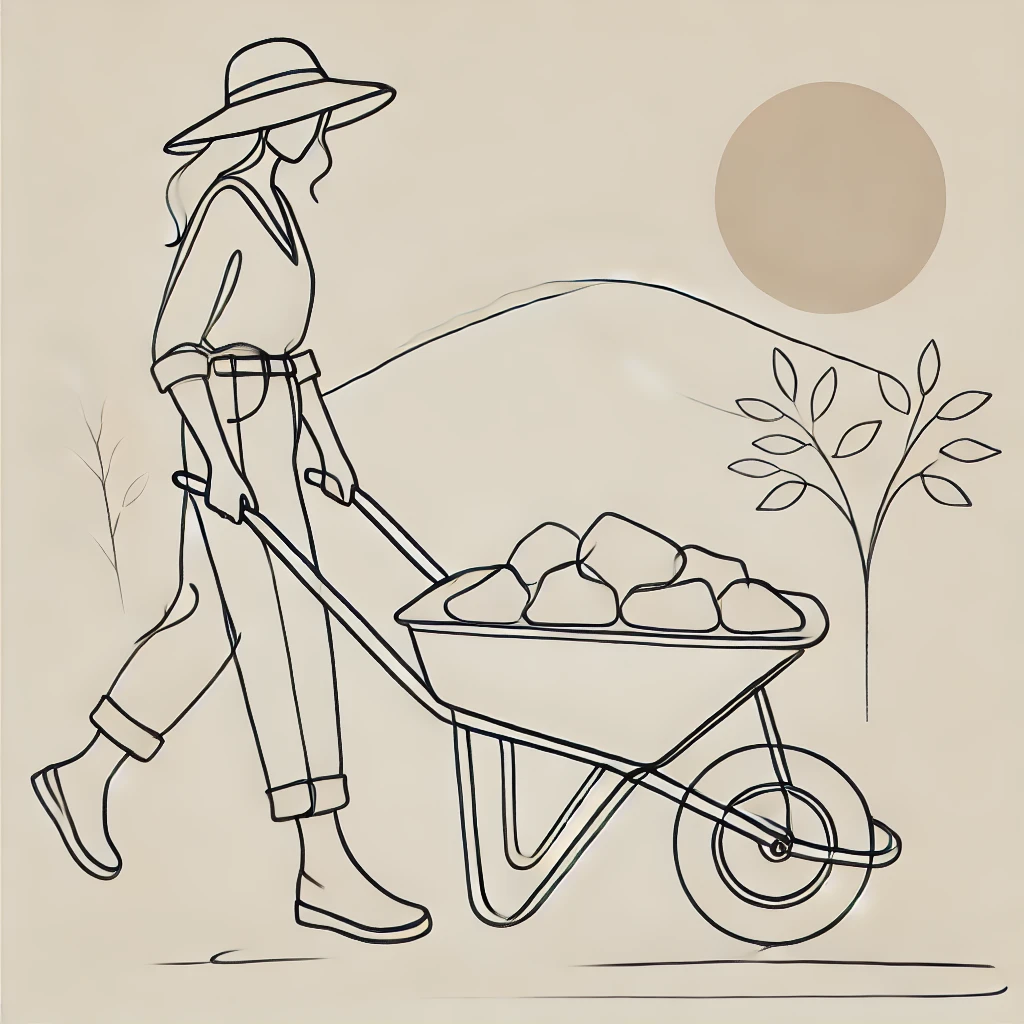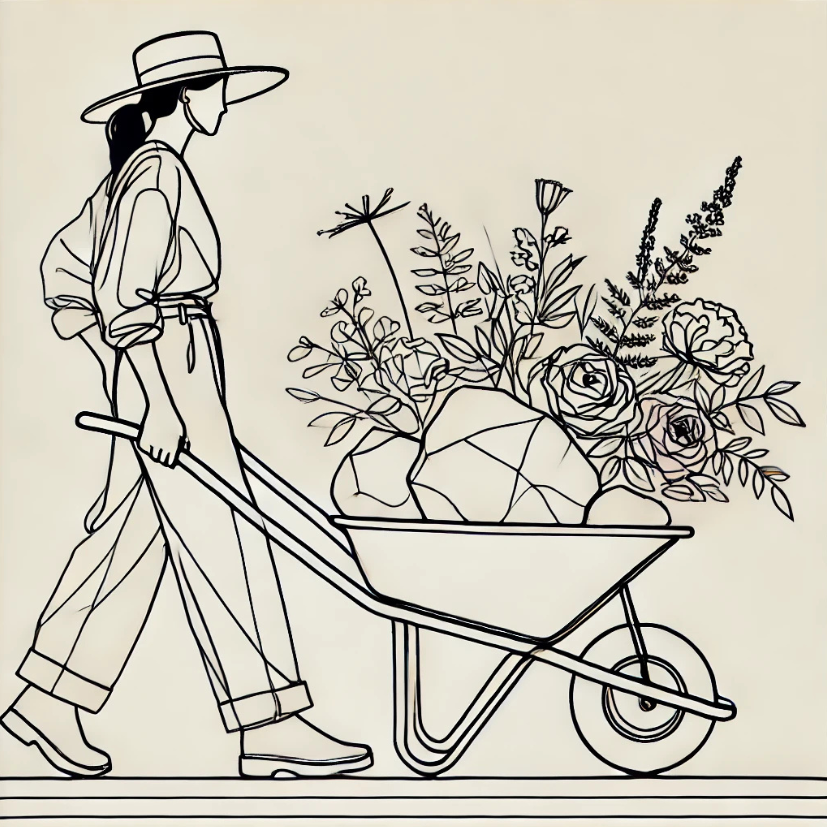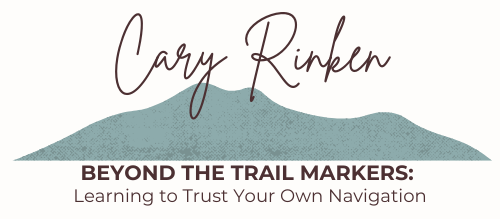
Liora walks along a dirt path, pushing ahead of her a wheelbarrow filled with rocks. The path is both bumpy and pitted and she struggles mightily to push this wheelbarrow along, stopping frequently from the exertion of it. The young woman is very tired, and feeling sorry for herself for having such a heavy burden.
Close behind her is another traveler, also pushing a wheelbarrow and struggling to do so. You see, everybody on this path has their own wheelbarrow. As one notices the other, they strike up a conversation, talking about how difficult it is to push these wheelbarrows over such rocky, bumpy, pitted terrain. They are commiserating together for a few minutes when the traveler asks the woman how she came to be on this road with these burdens.
This startles Liora. She abruptly stops walking, practically spilling her load. She is stumped. Nobody has ever asked her this before, and it has never occurred to her to question why she is carrying these rocks. Why is she on this particular road? Where is she heading? After some thought, she realizes that she began pushing her wheelbarrow a long time ago because she saw those around her doing the same. And she started out on this path, also because she witnessed others doing the same. She was and still is following the lead of those around her. It was the right thing to do, was it not?
She remembers that when she began her journey, her wheelbarrow only had a few small rocks in it. It was quite easy to push, even when the road was very pitted. As she traveled along, she began to gather other rocks in her wheelbarrow. Some she picked up from the path, simply feeling compelled to do so. Some she gained from fellow travelers, who would plead with her to help them, implying that she would be unkind if she refused. She would agree. And her load would grow heavier.
Occasionally now a traveler comes along that reminds her so much of herself that she can practically feel their pain and their struggle, having experienced it firsthand. Wanting to shelter them from feeling similarly weary as she had longed to be sheltered, she eagerly takes on some or even all of their load.
She does realize that she has grown very strong exactly by pushing her burden so far down this path for such a long time. And she similarly recognizes that it is this strength that even allows her the ability to offer help to the others. In the back of her mind, she worries that helping other travelers too much might be somehow depriving them of also growing strong from their own loads. She usually quickly lets that thought slip away, choosing to help them feel better in the moment. It is too hard to acknowledge that she might be inadvertently hurting those that she is genuinely intending to help.
Sometimes, though, she takes on the burdens of her fellow travelers in an effort to not seem mean or uncaring. She wants and needs to prove both to herself and to others that she is worthy of being loved and cared about and this is the only way she can think to achieve that. So, she helps everybody who asks her.
Occasionally, she even has a faster-moving fellow traveler walk by and casually toss some stones into her wheelbarrow as they pass, without even slowing down or stopping to consider her at all. In their effort to ditch their burdens, they are carelessly happy to throw them on anybody else and Liora then feels responsible to carry them forward. She can’t just leave them on the side of the road!
Every once in a while, she finds herself wondering where she actually is heading and whether she should be carrying these rocks. She always just concludes that the burdens are simply hers to carry and as for where she is heading – she assumes she will know the destination when she finds it. And there she will rest.
She has heard of and known other travelers who never made it to their fabled “destinations.” Others murmur and speculate that there is no actual destination but only a never-ending path and Liora wonders if she should start enjoying herself more along the path, rather than waiting to find happiness at the destination, where she can rest from pushing her burdens.
Liora sees smoother paths forking off of the main path – they seem to be heading in approximately the same direction and they look amazingly, gorgeously smooth and easy to traverse. Fellow travelers even invite her to join them as they diverge onto the other paths.
Her instinct is often to do so, to take their lead, but she has a vague recollection of being told at the beginning of her journey to expect it to be long and arduous. Doubting the other travelers’ intentions, she wonders if they might be leading her astray. She chooses to believe that she must stay on this path, the more difficult path, in order to prove her worth and her strength. So she trudges onward.
Other travelers sometimes ask her for advice on whether this is the right path. She tells them what she knows– that this is the path that they need to walk, repeating the belief that the path is supposed to be long and arduous, difficult and painful. She urges them to continue on as they are. When they ask her if she thinks they must continue to take on the burdens that are being thrown into their wheelbarrows by fellow travelers, she says that it is indeed their duty – that part of making meaning in the world is helping others with their burdens. This is what she tells others because this is what she believes.
Every once in a while she notices a beautiful flower on the side of the path, and has the urge to pick it up to beautify her load of rocks, but she doesn’t notice other people doing this all that often, so she talks herself out of it, resisting the urge, telling herself that it is frivolous and time-wasting.
One day she sees a particular traveler heading off in a different direction, onto a tree-lined smooth path with a wheelbarrow filled with beautiful flowers. This traveler’s wheelbarrow has the name Soleya painted onto the side of it and Liora surmises that this is her name. She can tell from the way Soleya is pushing her load that it is light. She watches Soleya with envy and wonder and even a bit of resentment as she witnesses her practically dancing down the pathway, singing and smiling. Just then, Liora sees another traveler pushing a very large and difficult load approach the light, burdenless traveler Soleya and beg her to carry some of his rocks for him. Soleya stops, smiles and lovingly leans in to hug this ever-so-burdened traveler. She can barely make out the exchange, but manages to hear Soleya say that she isn’t able to do that but that she knows this traveler will be able to find a way to lighten his own load. At this, the asker with the heavy load scoffs and revolts, calling Soleya names and scuffling away, crying and raging, even throwing a few of his rocks in her direction.
Liora is astonished that this beautiful traveler with such a light load refused to help this poor, desperate man. It both pains and intrigues her to watch this encounter, and she is curious to see Soleya wiping tears away as she continues with her light load down her path.
Liora can’t help but wonder how Soleya has come to have such a plethora of beautiful flowers in her wheelbarrow instead of all of these big, heavy, dull rocks that Liora is pushing. She assumes that some people just have better luck than others and she continues along her difficult path with her heavy load, once again feeling sorry for herself, just as another traveler passes her by, tossing a stone or two into her wheelbarrow. She sighs.
Sometimes, even though she hates to admit it, Liora still tries begging others to carry her burdens for her also, believing that she really needs help from the other travelers, and not wanting to continue carrying these burdens. They weren’t even hers to begin with. Sometimes they agree to help her out, increasing their own burdens, but sometimes they refuse. When she is refused, Liora grows angry. This fuels her desire to help others even more in an attempt to treat others as she herself wants to be treated.
Sometimes she has fellow travelers tell her that if she is not pushing just as heavy of a burden as they are that there must be something wrong with her. She believes them and keeps accepting and picking up more and more rocks in an attempt to prove (to herself and to others) that she will carry her load, that she is worthy.
Her load grows and her resentment grows as well.
One day, Liora is passed by another traveler who has the most beautiful wheelbarrow she has ever seen – it is painted in soft hues and even modified to be smaller, lighter and seemingly easier to push. Much like Soleya’s, this wheelbarrow is filled with beautiful wildflowers of every color, and even as it is being pushed down this difficult path, the load seems of little bother – it is so light and the front has not the hard, unforgiving wheel that most wheelbarrows have, but a bouncy and resilient sport wheel! It seems to take the bumps of the path with such ease. As this traveler makes their way down the path, Liora notices that she, too, has travelers attempting to throw rocks into her wheelbarrow. She, too, has others stopping to ask her if she could please help them carry their loads. She, too, has travelers trying to slow her down and make her load as cumbersome as theirs is. But what Liora witnesses is this traveler smiling at these travelers, sometimes stopping to hug them, and then continuing on her way without any of their burdens.
Liora struggles mightily to catch up with the woman, wanting to learn her secrets. Catching up is very difficult with her now overflowing wheelbarrow. There are so many rocks that they often fall out as she hits bumps, and Liora diligently stops to pick up each and every rock as it falls, assuming that it is now her job to transport them. Luckily the woman whom she is pursuing stops often to admire beautiful flowers on adjacent paths, and so Liora is able to eventually catch up.
Once she does, she asks the woman how she has come to be pushing such an amazingly beautiful wheelbarrow with such a lovely load. The woman introduces herself as Ambria and explains that she too had started out on the path gathering rocks and struggling to push her load until one day when she had been unable to resist the urge to stop and admire the beautiful flowers just off the path. Ambria had desperately wanted to add those flowers to her load to brighten her days, so she had done so. Soon thereafter, she realized that the flowers brought her such joy that she wanted to gather a few more, but she knew she would need to remove a rock or two to make some room.
It was then that she realized that she didn’t even know why she was carrying these rocks or where she was heading. She realized abruptly that she had a choice – that perhaps it was ok to remove a rock or two from the wheelbarrow. Maybe nobody actually needed to carry them. And that is what she did.
After pushing the ever-so-slightly-lighter load, she became inspired to take another rock out of her wheelbarrow and set it off to the side of the path. Ambria found the path much easier to travel without the extra weight. And as she put more rocks down, she had that much more room left for the flowers – soon she had just as many flowers as she had rocks.
Ambria also shares about meeting others who have speculated that there is no destination – that the path along which they are walking might in fact actually be the destination. So Ambria had decided that there was no harm in lightening the load. In fact, she explains that she was so inspired to keep replacing her rocks with flowers that little by little, rock by rock, flower by flower she was able to replace practically all of her rocks with flowers.

As she explains this to Liora, Liora looks forlornly at her own wheelbarrow that is filled to overflowing with large, heavy rocks. She just knows that she has to keep pushing this burden. And then she has a realization. Slowly Liora walks around, picks up one of the top rocks in her wheelbarrow and she hoists it out, placing it on the side of the road. Nearby she spots a beautiful patch of wildflowers. Selecting one, she adds it to the load.
That had been fairly simple actually. So, she does it once more.
She thanks Ambria profusely and the travelers each continue on their journeys.
Liora does have moments of fear, wondering if she is in fact “allowed” to do this. But there seems to be minimal risk in doing so, so she continues.
Before long, she has reduced her load to half of its original weight, adding such color to the wheelbarrow with the flowers that her heart flutters each time she glances at it.
Had it actually been this easy all along? Now she wondered if Soleya, the traveler heading off onto the smoother path, was also onto something by taking the smoother path with fewer travelers. Maybe?
She continues to notice these smoother paths cutting away from the main rocky path. And one time she spontaneously chooses to take one of them. Her already lighter load seems even lighter on this new path without the pits and rocks. Now when she stops to remove yet a few more of her rocks, she has the brilliant idea to stack them on top of each other, into a cairn, hoping to catch the attention of travelers coming along the path behind her, maybe inspiring them to follow her lead to both remove their own stones and veer off the bumpy path. She hopes that these burdens that she has been dutifully carrying for so long, that have indeed strengthened her, but that no longer serve any useful purpose, can now be used to guide others.
She continues doing this and eventually she, too, has a load that matches Ambria’s. Liora’s wheelbarrow is now filled with flowers and her burden is light. She finds herself practically dancing down the path and remembers seeing Soleya. She smiles at the sudden realization that she now is light and burdenless.
Liora still often has others asking for help, and now she smiles, sometimes hugging them, and tells them that while she can not carry their load, she understands how hard it is. Most importantly, she shares with them that they too have the choice to start removing rocks from their wheelbarrows when they are ready to do so. Most of the time they don’t believe her and they run off angrily with their heavy loads.
But she knows. If they pay attention, they will eventually see clearly what she had struggled to see for so long.
She had believed she needed to carry the rocks.
She had believed that she was heading toward a destination where she would finally get to rest.
Now she knows that the rocks don’t need to be carried, that the wheelbarrow can be filled with anything – rocks, beautiful flowers or something else.
Now she knows that there is no final destination, that the path in a way is the destination.
Yes, the path will still get rocky at times, and she will certainly find rocks in her wheelbarrow again. Now, though, she knows that she herself can take these burdens out, sometimes even building a cairn to lead the way for the travelers behind her.
Carrying the burdens is a choice. This is the destination.
What rocks do you have in your wheelbarrow?
Pick a rock to remove; add a flower.
Now do it again.
Build a cairn.
Look around – you are already there. The journey is the destination. Enjoy it now.
The choice is yours.


